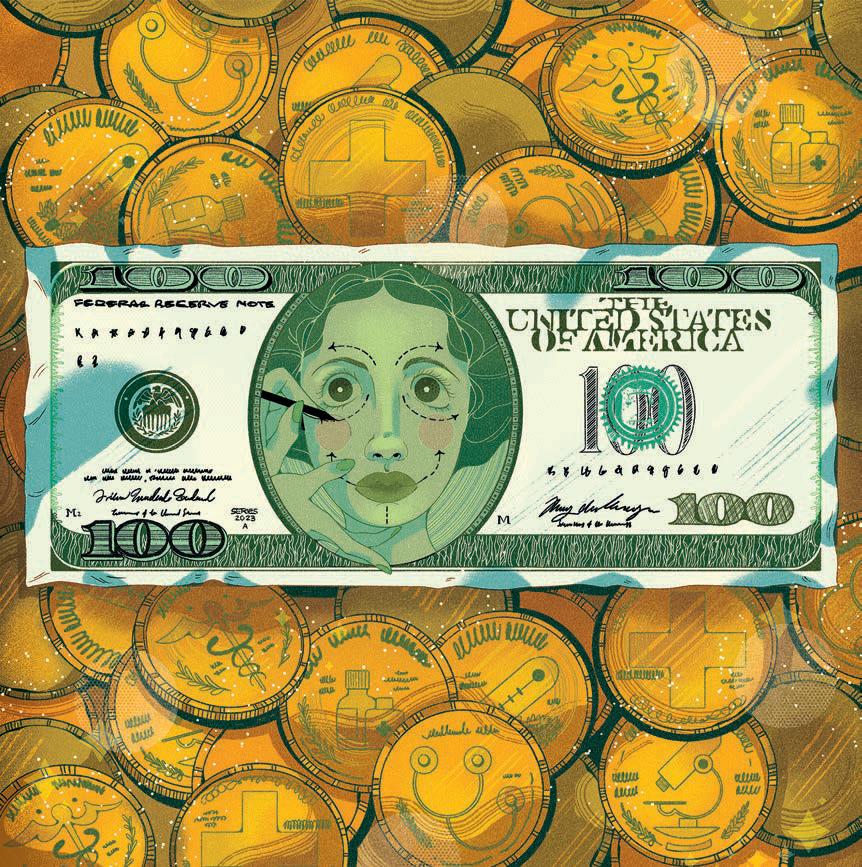Prøve GULL - Gratis
RICH DOC, POOR DOC
Mother Jones
|September/October 2023
Why do the most important kinds of doctors earn the least money?

FOR NEARLY THREE years of med school, I teased my friends who wanted to specialize in surgery. I'd heard stories of tantrums in the operating room, of residents too tired to be friendly, much less teach. But the first time I sutured a jumbled gash into a thin, smooth line, I knew I wanted to be a surgeon.
All medical students tell a version of this story, most of us acting as if our hero's journey has nothing to do with the money. But everything in medicine is about the money in some way or another. The higher a specialty's salary, the more people want to do it and the more competitive it becomes. As medical burnout has become practically universal, flexible specialties like radiology are becoming more popular, as students flee specialties like emergency medicine that put them on the front lines of American poverty and, more recently, a flat-footed pandemic response. Pediatrics, family medicine, and primary care do more than other specialties to extend patients' lives and keep them out of the hospital, but they tend to be the lowest-paid specialties in medicine. Medical students know it, and we vote with our feet. Between 2013 and 2020, the number of positions unfilled in pediatrics has more than quintupled. This past March, nearly 600 residency positions in family medicine went unfilled. By contrast, virtually every residency spot in radiology and plastic surgery in the United. States got filled.
Denne historien er fra September/October 2023-utgaven av Mother Jones.
Abonner på Magzter GOLD for å få tilgang til tusenvis av kuraterte premiumhistorier og over 9000 magasiner og aviser.
Allerede abonnent? Logg på
FLERE HISTORIER FRA Mother Jones

Mother Jones
TURNING THE TIDE
How Hawaii stopped locking girls up by starting to listen to them
18 mins
July/August 2025

Mother Jones
"WE DON'T ACTUALLY GIVE A FUCK"
10 ways to enrich the Trumps and the MAGA movement
9 mins
July/August 2025

Mother Jones
A CHILLING EFFECT
The Trump administration threatens polar ice research that could help save us from climate change.
3 mins
July/August 2025

Mother Jones
CYBER SECESSIONISTS
Silicon Valley moguls are creating regulation-free, crypto-based “network states.” And hoping to gobble up land near you.
17 mins
July/August 2025

Mother Jones
PARENT TRAP
Tech bros and “trads” are pushing women to have more babies. Just as long as they're the right kind of women.
22 mins
July/August 2025
Mother Jones
THE NEXT GENERATION
Meet the Elon Musk fans remaking education in his image.
6 mins
July/August 2025

Mother Jones
"TRUMP'S FAVORITE DEMOCRAT❞
Grassroots progressives used to love John Fetterman. Now they wonder what happened to him.
8 mins
July/August 2025

Mother Jones
FARM REDUCTION
The Trump administration's assault on small farmers
3 mins
July/August 2025

Mother Jones
ASPIES ÜBER ALLES
Elon Musk believes autism makes him superhuman. Just don't call it that.
10 mins
July/August 2025

Mother Jones
PUNCHING ABOVE OUR WEIGHT
Thanks to you, our trophy closet is overflowing.
3 mins
July/August 2025
